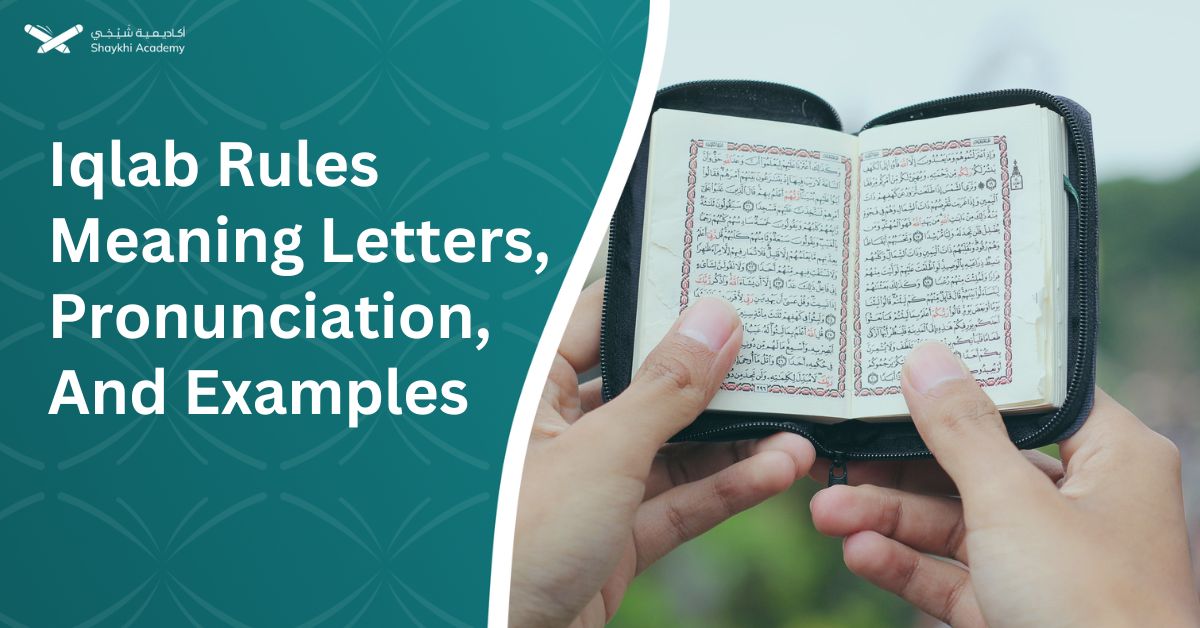What exactly is Iqlab, and how does it relate to the art of Tajweed? Delve into the concept of Iqlab, a fundamental rule within Tajweed that enriches the recitation of the Quran. But what exactly is Iqlab, and how does it influence Quranic recitation?
Why is this rule applied, and how can you identify and practice Iqlab in your own recitation? But practical application demands practice. How can you hone your skills in Iqlab? This article will delve into the world of Iqlab, exploring its meaning, significance, and practical application in Tajweed.

In a nutshell, Iqlab in Tajweed involves substituting the sound of “م” (meem) for the sound of “ن” (noon) or tanween when followed by the letter “ب” (ba). This transformation, while not altering the written form, ensures smoother recitation and maintains the flow and beauty of Quranic verses.
Iqlab is crucial for facilitating recitation, preserving clarity, and enhancing the melodic rhythm of the Quran. The letter “ب” (ba) serves as the sole trigger for Iqlab, occurring when noon sakina or tanween precedes it.
Practicing Iqlab involves identifying its occurrences in the Quran, using Tajweed resources, listening to expert recitations, practicing with individual words, and seeking feedback to ensure accurate pronunciation.
Defining Iqlab
The word Iqlab in Arabic literally means “to turn over” or “to change.” So, in its linguistic sense, Iqlab refers to the transformation or alteration of something from its original state.
What is Iqlab in Tajweed?
Iqlap in tajweed refers to the substitution of the sound of Meem for the sound of Nun when certain conditions are met. Iqlap in tajweed specifically entails changing the pronunciation of the letter “ن” (noon) or the noon of tanween into a “م” (meem) sound when followed by the letter “ب” (ba). This transformation occurs not in the written form but in the pronunciation, considering the characteristics of articulation and phonetics.

The Significance of Iqlab
The significance of Iqlab lies in preserving the harmony and flow of recitation while adhering to the rules of Tajweed. By implementing Iqlab, the reciter ensures correct articulation, phonetic accuracy, and maintains the beauty of Quranic recitation. It allows for smoother transition between letters and enhances the overall melodic rhythm of the Quranic verses.
Why is Iqlab applied?
The rule of Iqlab is applied to make the pronunciation of the Quran easier and more fluent. The sound of Meem is more easily articulated when it is followed by the letter Baa than the sound of Nun.
The rule of Iqlab is based on the principle of making the recitation of the Quran easier and more fluent. The noon and baa are two very different letters, and pronouncing them together can be difficult. By changing the pronunciation of the noon to a meem, the two letters become more similar and easier to pronounce.

So, we could say that the application of Iqlab stems from several key reasons:
- Facilitating Recitation: Pronouncing a mim after a baa is phonetically easier than a final noon.
- Preserving Clarity: The mim sound prevents overlapping with pronunciations of surrounding letters.
- Enhancing Beauty: Iqlab adds a melodic flow to the recitation of the Quran.
What is Iqlab letter?
In Tajweed, the letter “ب” (ba) is the sole trigger for Iqlab. Whenever a noon or tanween precedes the letter “ب,” whether within a word or between two words, or when the tanween is followed by “ب” within two separate words, Iqlab is mandated. It involves pronouncing the noon or tanween as “م” (meem), ensuring proper articulation while maintaining the characteristics of ghunnah (nasalization) and ikhfa (concealment).

What is the Rule of Iqlab?
The rule of Iqlab applies in two situations:
- When Noon Saakinah is followed by the letter Baa: This can occur within a single word or between two separate words. For example, in the word “لَيُنْبَذَنَّ” “layunbadhan”, the Noon Sakinah is converted to a Meem because it is followed by the letter Baa.

- When Tanween is followed by the letter Baa: Tanween is the diacritic that indicates an indefinite noun. When Tanween is followed by the letter Baa, it is converted to a Meem. For example, in the phrase “سَمِيعٌ بَصِيرٌ” “samee’un basir”, the Tanween on the word سَمِيعٌ is converted in pronunciation to a Meem because it is followed by the letter Baa.
How is Iqlab pronounced?
To achieve accurate Iqlab pronunciation when applying the rule of Iqlab, the following four things must be kept in mind:
- Convert the noon sakinah or noon of tanween to a meem م sound, but only in spoken recitation, not in writing.
- The Meem is pronounced with ghunna (nasalization).
- The Meem is pronounced with ikhfaa (concealment), meaning that it is not fully articulated.
- Avoid excessive lip movement when forming the meem sound.
How to Identify Iqlab in the Mushaf?
In the Mushaf, the rule of Iqlab is often indicated by a small Meem (م) written above the Noon Sakinah or Tanween. This is a visual cue to remind the reader to pronounce the letter as a Meem.

Examples of Iqlab in the Quran
The Quran provides numerous examples illustrating this rule. We will explore Iqlab in various contexts, including when the letters noon and ba appear within a single word, across separate words, following a noon sakinah, and following a tanween. By examining these examples, you will gain a deeper understanding of proper Quranic recitation.
1. Single Word Examples
- Allah says: “قَالَ يَا آدَمُ أَنبِئْهُم بِأَسْمَائِهِمْ”
“Qala ya Adamu anbihum bi-asma’ihim.” (Surat Al-Baqarah, 2:33)
Here, the letters noon and ba are combined in the word “أَنبِئْهُم,” prompting the reader to pronounce the noon as mim.
- In another verse, Allah says: “كَلَّا لَيُنْبَذَنَّ فِي الْحُطَمَةِ”
“Kalla layunbadhan fi al-hutamah” (Surah Al-Humaza, 104:4)
The letters noon and ba are again combined in the word “لَيُنْبَذَنَّ,” resulting in iqlab.
2. Examples Across Two Words
- Allah says: “مِن بَعْدِ وَصِيَّةٍ يُوصَىٰ بِهَا”
“Min ba’di wasiyyatin yus’aa biha” (Surah An-Nisa, 4:11)
The letter noon is followed by ba in separate words, leading to iqlab.
- Similarly, in the verse “وَاللَّهُ عَلِيمٌ بِذَاتِ الصُّدُورِ”
“Wa Allahu ‘alimun bi-dhati as-sudur” (Surah Ali ‘Imran, 3:154)
The pronunciation alters because the letter noon is followed by ba in separate words.
3. Iqlab Following Noon Sakinah
- Allah says: “وَأَمَّا مَنْ بَخِلَ وَاسْتَغْنَى”
“Wa amma man bakhila wa astaghna” (Surah Al-Layl, 92:8)
The letter ba follows a noon sakina, leading to iqlab.
- In another instance, in the verse “فَلَمَّا جَاءَهَا نُودِيَ أَن بُورِكَ مَن فِي النَّارِ”
“Falamma ja’aha nudiya an buurika man fi an-naar” (Surah An-Naml, 27:8)
The letter ba follows a noon sakina, resulting in iqlab.
4. Iqlab Following Tanween
- Allah says: “واللهُ سَمِيعٌ بَصِيرٌ”
“Wallahu samee’un basir” (Surah Al-Hajj 22:75)
Iqlab occurs after a tanween with damma, followed by the letter ba.
- Similarly, in the verse “ذُرِّيَّةً بَعْضُها مِنْ بَعْضٍ”
“Dhurriyyatan ba’duha min ba’din” (Surah Ali-Imran 3:34)
Iqlab happens after a tanween with a fatha followed by the letter ba.

How to Practice Iqlab?
Practicing Iqlab in Tajweed requires dedicated effort and focused attention to detail. Here are some steps to effectively practice Iqlab:
1. Identify Iqlab occurrences in the Quran
- Start with a short Surah (chapter) you’re familiar with.
- Look for words ending in noon (ن) or containing tanween (تنوين) followed by the letter baa (ب). These are potential spots for Iqlab.
2. Use Tajweed resources
- Consult a Tajweed reference book or website that highlights Iqlab markings in the Quran.
- Many Mushafs have colored markings or symbols above the letters to indicate Tajweed rules like Iqlab.
3. Listen to Quran recitations with Tajweed emphasis
- Find recordings of reciters known for their mastery of Tajweed.
- Pay close attention to how they handle the transition from noon/tanween to baa.
- Try to mimic their pronunciation, focusing on the subtle mim sound and nasalization.
4. Practice with individual words
- Isolate words where Iqlab applies, like “ لَيُنْبَذَنَّ – layunbadhan” or “سَمِيعٌ بَصِيرٌ – samee’un basir”.
- Pronounce the word normally first, then practice converting the final sound to a mim with proper nasalization.
5. Record yourself and seek feedback
- Record yourself reciting words or short verses with Iqlab.
- Play back your recording and listen attentively for any inconsistencies or areas where the Iqlab pronunciation might be unclear. Are the transitions smooth? Is the nasalization evident? Be your own quality control!
- Consider finding a Quran teacher or someone familiar with Tajweed who can provide feedback on your pronunciation.
Additional Tips for Mastering Iqlab
- Prioritize accuracy over speed, especially during the initial practice stages. Once you’ve developed a good grasp of the correct pronunciation, you can gradually increase your recitation speed.
- The key to mastering Iqlab lies in achieving a smooth transition from the ending sound (noon/tanween) to the mim, accompanied by nasalization. This creates a melodic flow that enhances the beauty of your recitation.
- Consistency is key! Dedicate regular practice sessions to solidify the Iqlab pronunciation in your muscle memory. The more you practice, the more natural and effortless it will become.
- Take advantage of online resources like Tajweed apps or interactive websites. Many offer audio demonstrations of Iqlab pronunciation, providing valuable auditory aids to supplement your practice sessions.

Mastering Iqlab and Beyond with Shaykhi Academy
This article explored the intricacies of Iqlab, including the conditions for its application and its impact on pronunciation. But how can you truly integrate Iqlab and other Tajweed rules into your recitation?
Take your Quran recitation to the next level with Shaykhi Academy’s Online Tajweed Course!
In our comprehensive program, you’ll gain a thorough understanding of Iqlab alongside other essential Tajweed concepts. Our expert instructors will guide you through:
- The theory and practice of Tajweed rules: Learn not only the “what” but also the “how” of Tajweed, mastering the practical application of Iqlab in various Quranic contexts.
- Pronunciation techniques: Perfect the proper articulation points (Makharij) and characteristics (Sifat) of Arabic letters, ensuring accurate and nuanced pronunciation that reflects Iqlab’s subtle transformation.
- Personalized feedback: Receive guidance from certified native Arabic tutors who will identify areas for improvement and help you refine your recitation of verses containing Iqlab.
Enroll in Shaykhi’s Online Tajweed Course today and Enjoy your free trial sessions. Let’s perfect your recitation, one Tajweed rule – including Iqlab – at a time!

Shaykhi Academy goes beyond just teaching Tajweed. Discover Your Quranic Path:
- Quran and Tajweed Courses: Delve into the sacred verses of the Holy Quran with our specialized courses designed to teach proper recitation and pronunciation, guided by the principles of Tajweed.
- Arabic Language Courses: Unlock the linguistic beauty of Arabic with our tailored language courses, suitable for beginners and advanced learners alike. Mastering Arabic opens doors to a deeper comprehension of Islamic texts and traditions.
- Islamic Studies Courses: Immerse yourself in the depths of Islamic knowledge through our specialized educational programs. Our interpretation course stands out as a cornerstone, offering insights into the profound meanings embedded within the Quran.

Conclusion
In conclusion, mastering Iqlab in Tajweed is essential for reciting the Quran accurately and melodiously. By understanding the linguistic concept of Iqlab and its application in Tajweed, reciters can enhance their proficiency in Quranic recitation.
The significance of Iqlab lies in its role in preserving the harmony and flow of recitation, facilitating ease of pronunciation, and adding beauty to the recitation. With dedicated practice, attention to detail, and utilization of Tajweed resources, reciters can refine their pronunciation of Iqlab and elevate their overall Quranic recitation.
Through consistent practice, reciters can ensure that their recitation of the Quran adheres to the rules of Tajweed, including the application of Iqlab, thereby honoring the sacred text and conveying its message with clarity and reverence.

















































